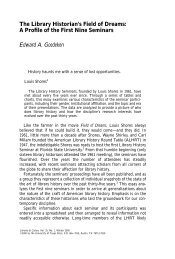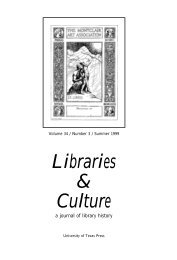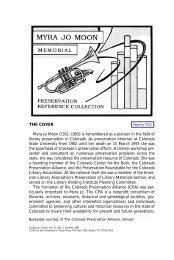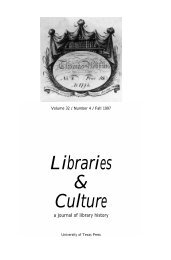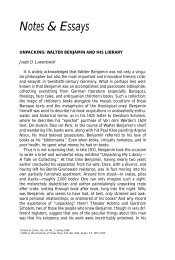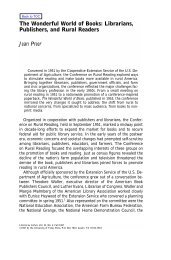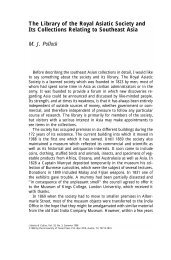Full issue (pdf file, 973 kb) - School of Information - The University of ...
Full issue (pdf file, 973 kb) - School of Information - The University of ...
Full issue (pdf file, 973 kb) - School of Information - The University of ...
You also want an ePaper? Increase the reach of your titles
YUMPU automatically turns print PDFs into web optimized ePapers that Google loves.
Print culture history has also generated increased interest in the personal<br />
library collections <strong>of</strong> several famous American authors, including<br />
Mark Twain, Flannery O’Connor, Henry James, and Henry David<br />
Thoreau. 44 Students <strong>of</strong> American library history should also consult<br />
Kevin Hayes’s <strong>The</strong> Library <strong>of</strong> William Byrd <strong>of</strong> Westover. 45<br />
Predecessors to the Public Library<br />
Solid works treating predecessors to the public library include David<br />
Kaser’s A Book for a Sixpence, which covers the history <strong>of</strong> the circulating<br />
library in the United States, Haynes McMullen’s research on social<br />
libraries before 1876, and Edward Stevens’s analysis <strong>of</strong> the relationships<br />
between wealth and social library membership in early-nineteenthcentury<br />
Ohio. 46 Other works worthy <strong>of</strong> mention include Charles<br />
Laugher’s Thomas Bray’s Grand Design, Joe Kraus’s analysis <strong>of</strong> nineteenthcentury<br />
YMCA libraries, and C. S. Thompson’s Evolution <strong>of</strong> the American<br />
Public Library, 1653–1876. 47 Solid analyses <strong>of</strong> nineteenth-century school<br />
district and Sunday school libraries remain to be written.<br />
Public Libraries<br />
Public library history enjoys a generous literature. Shera outlined the<br />
origins <strong>of</strong> the public library before it evolved into an institution; Ditzion<br />
took it from there with his Arsenals <strong>of</strong> Democracy, which set the tone for<br />
viewing the public library as an agency that facilitated democratic culture<br />
and an informed citizenry. His perspective dominated the literature<br />
<strong>of</strong> public library history for the next quarter century and was evident in<br />
the public library histories for Boston, Detroit, Baltimore, New York,<br />
Cleveland, Minneapolis, and Buffalo that followed. 48 Works on continuing<br />
education services to adults in public library history literature echo<br />
the tone <strong>of</strong> these favorable treatises. 49<br />
But Harris’s 1<strong>973</strong> essay signaled a shift in public library historiography.<br />
No subject within public library history demonstrates this shift better<br />
than the literature surrounding the library philanthropy <strong>of</strong> Andrew<br />
Carnegie. For example, George Bobinski’s Carnegie Libraries outlines the<br />
philanthropy but sidesteps <strong>issue</strong>s <strong>of</strong> motive and intent. 50 David I.<br />
Macleod does a bit better in his study <strong>of</strong> Carnegie libraries in<br />
Wisconsin. 51 A new, more critical history, however, appears in Carnegie<br />
Denied, which consists <strong>of</strong> a series <strong>of</strong> essays edited by Bob Martin that<br />
examine the reasons scores <strong>of</strong> communities rejected Carnegie grants. 52<br />
Essay authors find gender, race, and class <strong>issue</strong>s (among others) laced<br />
throughout community reactions. More recently, Abigail Van Slyck<br />
looked at the architecture <strong>of</strong> typical Carnegie library buildings from a<br />
13



